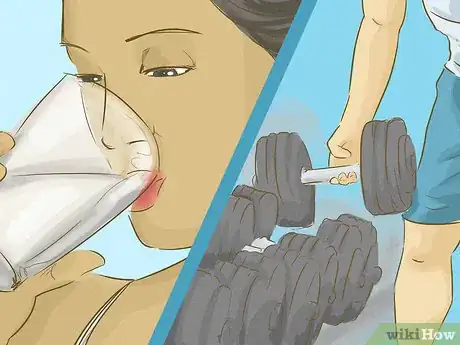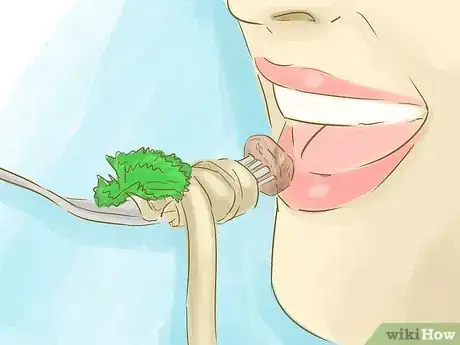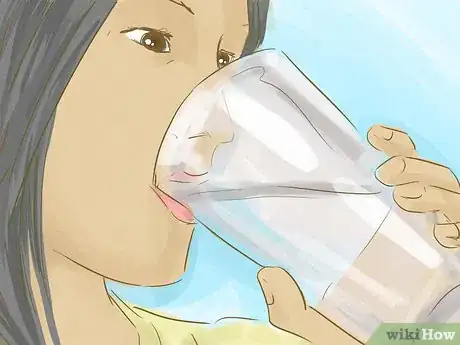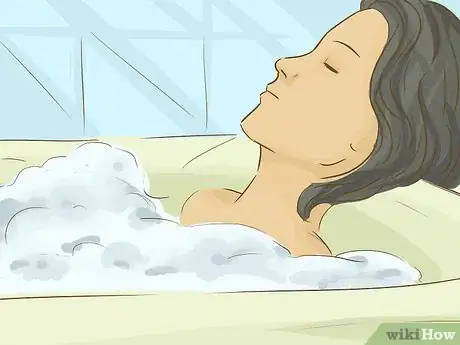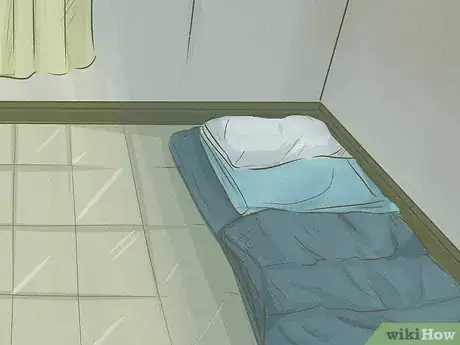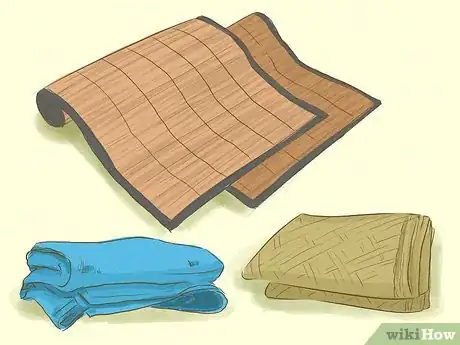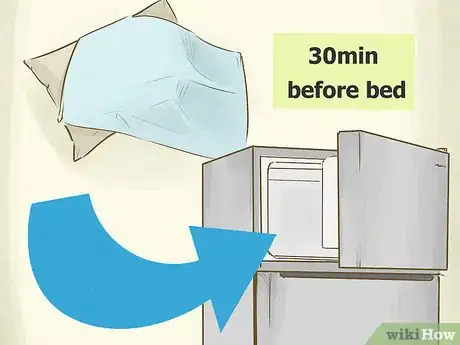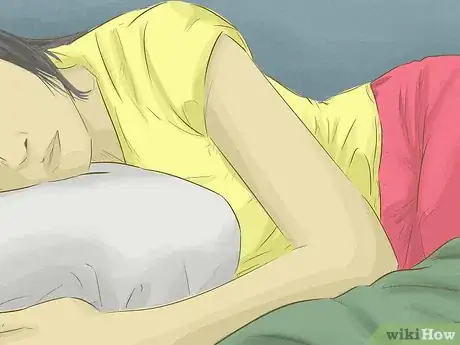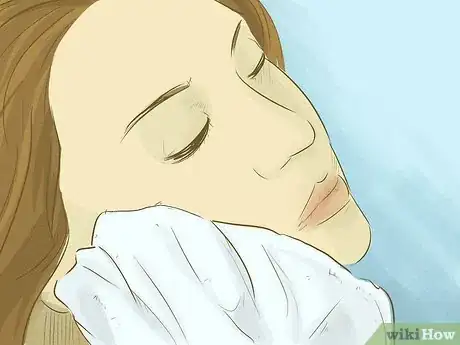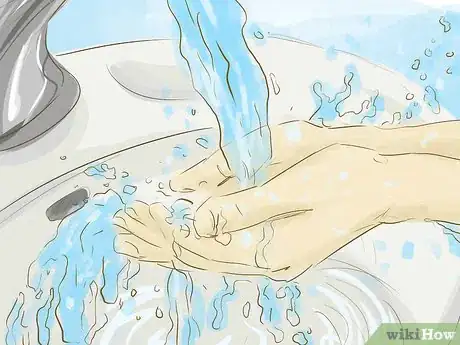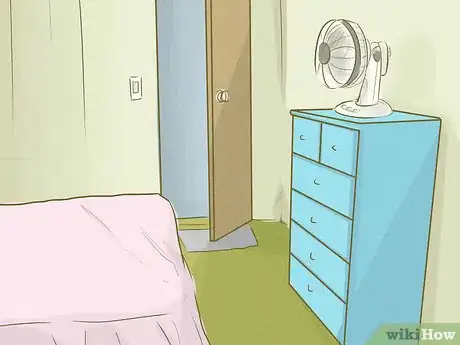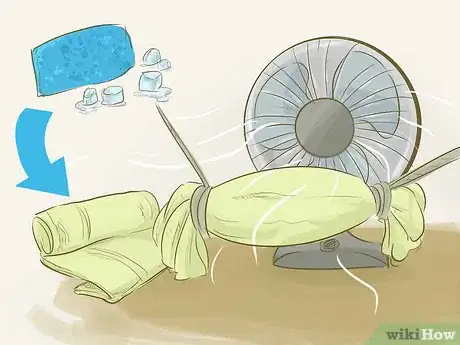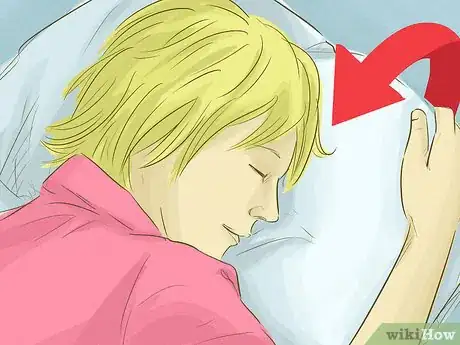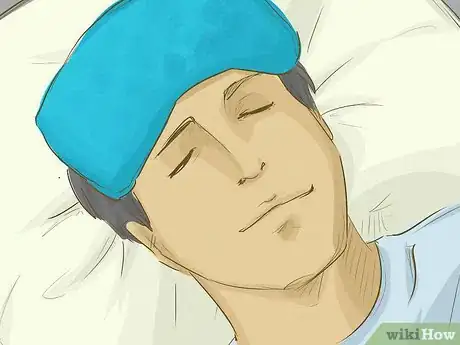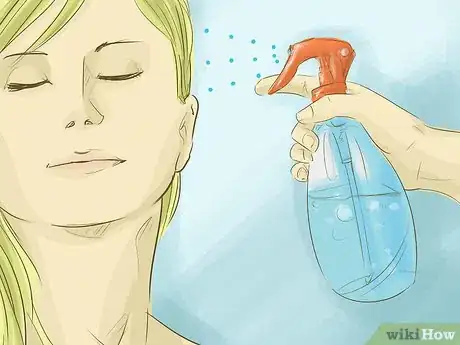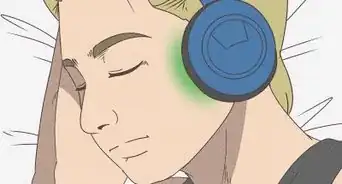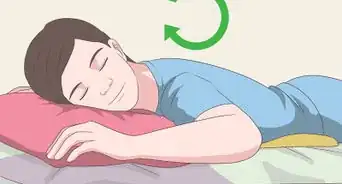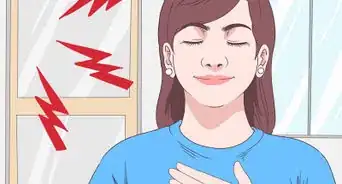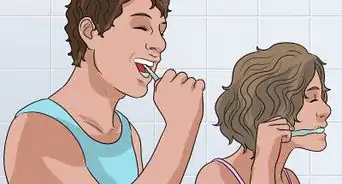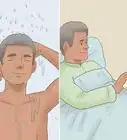This article was medically reviewed by Alex Dimitriu, MD. Alex Dimitriu, MD is the Owner of Menlo Park Psychiatry and Sleep Medicine, a clinic based in the San Francisco Bay Area with expertise in psychiatry, sleep, and transformational therapy. Alex earned his Doctor of Medicine from Stony Brook University in 2005 and graduated from the Stanford University School of Medicine's Sleep Medicine Residency Program in 2010. Professionally, Alex has dual board certification in psychiatry and sleep medicine.
wikiHow marks an article as reader-approved once it receives enough positive feedback. This article received 26 testimonials and 81% of readers who voted found it helpful, earning it our reader-approved status.
This article has been viewed 2,686,226 times.
When it's hot outside and you don't have air conditioning, it can be difficult to fall asleep. Fortunately, there are ways to get cool and remain cool long enough for you to doze off and get a good night’s sleep.
Steps
Preparing to Go to Bed
-
1Stop exercising a few hours before bedtime and drink plenty of water. When you exercise, you raise your body temperature and retain heat. Not exercising several hours before you go to bed will give your body time to cool down.[1]
- You should also drink lots of water throughout the day to stay hydrated. You may also want to keep water by your bedside.
-
2Avoid large or spicy foods or meals. Eating a heavy meal or spicy food before bedtime may cause you to feel even hotter. Eat a light dinner at least two to three hours before bed and skip the spices and hot sauce.Advertisement
-
3Avoid drinking ice cold water. Drinking cold water not only slows digestion, but it also slows down metabolism by constricting blood vessels, which messes with your body’s ability to cool off.
-
4Take a tepid shower or a bath. Take a very cold shower, as this can have a rebound effect.
- You can also soak your hands and feet in tepid water. Your hands and feet are your "radiators", or the areas of your body that tend to heat up. Cooling them down by soaking them will regulate your body temperature and cool you down.
-
5Find a cool, dark sleeping spot that is on a lower floor or in a basement. Heat rises, so find a spot that is low to the ground, such as the floor of your bedroom, or that is low in your home, such as the bottom floor or the basement.[2]
-
6Replace heavy bedding with lighter bedding. Remove thick mattress protectors or pads, which retain heat, and any heavy blankets or duvets. Use lighter bedding like cotton sheets and lightweight cotton weave blankets on your bed.[3]
- Straw or bamboo mats are also great for a cool night’s sleep. They do not retain body heat and will not warm you up. You can create a bamboo mat bed on the floor of your bedroom for an alternative spot to your regular bed.
-
7Put your bedding in the freezer. Stick your pillow cases, bed sheets and blankets in the freezer 30 minutes before you plan to go to bed. Once you place the bedding on your bed, they should stay cool enough for 30 to 40 minutes, just enough time to fall asleep.
- Avoid getting your bedding wet or sleeping on or in wet sheets or clothing. Don’t dip your socks in cold water and wear them to bed, or wear a wet t-shirt to bed. Bringing anything wet into the room, or wearing anything wet, will only trap dense humidity in your room and cause discomfort.[4]
-
8Open your windows or use an air conditioner. An hour before bedtime, open the windows in the room to increase air circulation and cool down the room. However, you should close the windows before you fall asleep to avoid heating up the room with air during the night.
- While you sleep, your body temperature dips to its lowest point at around 3 am. At 3 am, the temperature outside is also extremely low. If you are asleep with the windows open, the muscles around your neck and head can tense up involuntarily due to the sudden temperature drop and you can be woken up.
- Keep the windows closed and the blinds or shades drawn during the day to avoid heating up the room.
-
9Sleep in cotton clothing or wear as little as possible when going to bed. Though you may be tempted to strip down and go naked to stay cool, sleeping naked can make you feel hotter as it does not allow moisture to evaporate between your body and the sleeping surface. Go for cotton sleepwear, and avoid synthetic fabrics like nylon or viscose, as they are not breathable and can make you feel hotter.[5]
-
10Wipe your face, hands, and feet with a damp cloth. Use a damp cloth or towel by your bedside to wet your face or arms throughout the night. But avoid going to sleep with a wet face or arms. Once you have wiped your body, dry yourself off with a dry towel before you go to sleep.
- You can also buy special towels that are made of hyper-evaporative material that retains water, but stays dry to the touch. They will cool you down without getting your skin wet.
-
11Run your wrists or the inside of your arms under cold running water for 30 seconds. These areas are where your blood stream flows closest to the surface of your body. Running them under cold water for a minute will cool your blood down, making your whole body cooler.[6]
Staying Cool in Bed
-
1Encourage airflow with a fan. Keep the bedroom door open and position the fan in a corner of the room so it faces your bed.[7]
- Avoid pointing the fan at your face, your back, or too close to your body. Pointing the fan at your face can cause your neck muscles to stiffen and lead to allergies or illness.
-
2Make an ice towel. Before there was AC, people would suspend ice packs, ice towels, or cooling packs in front of fans to stay cool.
- To make an ice towel, hang a wet towel holding ice cubes from two chairs. Point a fan at the towel and at a wall or far away from you in the corner of the room.
- Place a container under the towel to catch the melting ice water.
-
3Flip your pillow over to the cool side. If you wake up due to heat during the night, flip your pillow over to the other side. The other side will be cooler than the side you were sleeping on, as it has not absorbed your body heat during the night.[8]
-
4Place an ice pack on your neck or forehead. You can buy cold packs in most grocery stores. Slip a cold pack under your neck, on your forehead, or under your arms, by your armpits. Cooling down the back of your neck, your forehead, and under your arms helps cool the rest of your body down as well.
- You can also make your own cold pack at home. Place three to four tablespoons of dish soap in a resealable Ziploc bag. Place it in the freezer. The soap will not harden, and it will hold the cold temperature longer than ice and/or the blue ice packs. Once you are ready to use it, place in a pillowcase or fold it in a towel and apply it to your neck or arms. Because the pack is not solid, it is versatile and comfortable on most areas of your body.
- You can also make a rice sock. Place it in the freezer and leave it there for at least two hours. When you turn in, bring the bag with you to use as a cool compress. Try placing it under your pillow so it's nice and cool when you flip it over.
-
5Mist your face and neck with a spray bottle. If you wake up during the night due to heat, take a spray bottle and fill it with cold water. Mist your face and neck to cool down.[9]
Expert Q&A
Did you know you can get expert answers for this article?
Unlock expert answers by supporting wikiHow
-
QuestionWhat's the best temperature for sleep?
 Alex Dimitriu, MDAlex Dimitriu, MD is the Owner of Menlo Park Psychiatry and Sleep Medicine, a clinic based in the San Francisco Bay Area with expertise in psychiatry, sleep, and transformational therapy. Alex earned his Doctor of Medicine from Stony Brook University in 2005 and graduated from the Stanford University School of Medicine's Sleep Medicine Residency Program in 2010. Professionally, Alex has dual board certification in psychiatry and sleep medicine.
Alex Dimitriu, MDAlex Dimitriu, MD is the Owner of Menlo Park Psychiatry and Sleep Medicine, a clinic based in the San Francisco Bay Area with expertise in psychiatry, sleep, and transformational therapy. Alex earned his Doctor of Medicine from Stony Brook University in 2005 and graduated from the Stanford University School of Medicine's Sleep Medicine Residency Program in 2010. Professionally, Alex has dual board certification in psychiatry and sleep medicine.
Sleep Medicine & Psychiatry Professional
-
QuestionWhy do so many people like to sleep when it's colder?
 Alex Dimitriu, MDAlex Dimitriu, MD is the Owner of Menlo Park Psychiatry and Sleep Medicine, a clinic based in the San Francisco Bay Area with expertise in psychiatry, sleep, and transformational therapy. Alex earned his Doctor of Medicine from Stony Brook University in 2005 and graduated from the Stanford University School of Medicine's Sleep Medicine Residency Program in 2010. Professionally, Alex has dual board certification in psychiatry and sleep medicine.
Alex Dimitriu, MDAlex Dimitriu, MD is the Owner of Menlo Park Psychiatry and Sleep Medicine, a clinic based in the San Francisco Bay Area with expertise in psychiatry, sleep, and transformational therapy. Alex earned his Doctor of Medicine from Stony Brook University in 2005 and graduated from the Stanford University School of Medicine's Sleep Medicine Residency Program in 2010. Professionally, Alex has dual board certification in psychiatry and sleep medicine.
Sleep Medicine & Psychiatry Professional
-
QuestionWhy do I always wake up sweating when it's cool out?
 Alex Dimitriu, MDAlex Dimitriu, MD is the Owner of Menlo Park Psychiatry and Sleep Medicine, a clinic based in the San Francisco Bay Area with expertise in psychiatry, sleep, and transformational therapy. Alex earned his Doctor of Medicine from Stony Brook University in 2005 and graduated from the Stanford University School of Medicine's Sleep Medicine Residency Program in 2010. Professionally, Alex has dual board certification in psychiatry and sleep medicine.
Alex Dimitriu, MDAlex Dimitriu, MD is the Owner of Menlo Park Psychiatry and Sleep Medicine, a clinic based in the San Francisco Bay Area with expertise in psychiatry, sleep, and transformational therapy. Alex earned his Doctor of Medicine from Stony Brook University in 2005 and graduated from the Stanford University School of Medicine's Sleep Medicine Residency Program in 2010. Professionally, Alex has dual board certification in psychiatry and sleep medicine.
Sleep Medicine & Psychiatry Professional
Things You'll Need
- Fan
- Ice
- Ice Pack
- Spray Bottle
- Clothes
References
- ↑ http://www.sahealth.sa.gov.au/wps/wcm/connect/c8d0d6804a317392b6ddb719de427f3b/SleepingExtremeHeat-PHCS-EMU-20120217.pdf?MOD=AJPERES
- ↑ Alex Dimitriu, MD. Sleep Specialist. Expert Interview. 16 October 2019.
- ↑ http://www.sahealth.sa.gov.au/wps/wcm/connect/c8d0d6804a317392b6ddb719de427f3b/SleepingExtremeHeat-PHCS-EMU-20120217.pdf?MOD=AJPERES
- ↑ http://www.sahealth.sa.gov.au/wps/wcm/connect/c8d0d6804a317392b6ddb719de427f3b/SleepingExtremeHeat-PHCS-EMU-20120217.pdf?MOD=AJPERES
- ↑ http://www.sahealth.sa.gov.au/wps/wcm/connect/c8d0d6804a317392b6ddb719de427f3b/SleepingExtremeHeat-PHCS-EMU-20120217.pdf?MOD=AJPERES
- ↑ http://www.sahealth.sa.gov.au/wps/wcm/connect/c8d0d6804a317392b6ddb719de427f3b/SleepingExtremeHeat-PHCS-EMU-20120217.pdf?MOD=AJPERES
- ↑ http://www.sahealth.sa.gov.au/wps/wcm/connect/c8d0d6804a317392b6ddb719de427f3b/SleepingExtremeHeat-PHCS-EMU-20120217.pdf?MOD=AJPERES
- ↑ http://www.sahealth.sa.gov.au/wps/wcm/connect/c8d0d6804a317392b6ddb719de427f3b/SleepingExtremeHeat-PHCS-EMU-20120217.pdf?MOD=AJPERES
- ↑ http://www.sahealth.sa.gov.au/wps/wcm/connect/c8d0d6804a317392b6ddb719de427f3b/SleepingExtremeHeat-PHCS-EMU-20120217.pdf?MOD=AJPERES
About This Article
To sleep comfortably on a hot night, wear light cotton pajamas, which are breathable and will help wick moisture away from your skin. If you can, find a spot to sleep that is on a lower floor, or if that’s not possible, sleep on the floor of your room, since heat rises and the floor will stay cooler. Then, keep the door open and run a fan facing your bed to encourage air flow. Also, try slipping an ice pack under your neck or on your forehead as you fall asleep to make your whole body feel cooler. For tips from our Nurse reviewer on how to make an ice towel to create a cool breeze with your fan, read on!
